New Delhi: The central government has denied allegations of an increase in attacks on Christians in India and termed the media reports on this “unfounded” and “baseless”.
In an affidavit filed in the Supreme Court Tuesday, the Union Ministry of Home Affairs (MHA) opposed a Public Interest Litigation (PIL) filed by Reverend Dr Peter Machado of National Solidarity Forum, Reverend Vijayesh Lal of Evangelical Fellowship of India, and others, that has sought the constitution of state-wise special investigation teams (SIT) to probe “attacks on Christians”.
While the National Solidarity Forum was reportedly constituted by over 70 organisations and groups that came together in the wake of the 2008 Kandhamal violence, the Evangelical Fellowship of India describes itself as a “national alliance of evangelical Christians… a central network of evangelicals and a service organisation”.
The PIL also prays for a direction to states to assess the alleged damage caused to property and compensate the victims. It claims that, in several instances, the police register false cases against Christians while they are the victims of violence.
However, the MHA’s affidavit, accessed by ThePrint, accuses the petitioners of relying on “false” and “self-serving documents” along with press reports. It says the PIL is based on mere conjectures, and was filed for an “oblique purpose”.
Some reports projected legal actions taken by the local administration against illegal acts such as religious targeting of places, the affidavit claimed.
The central government also sought to take a dig at what it described as a “recent trend” where “certain organisations start planting articles and preparing self-serving reports themselves or through their associates”. These writings eventually become the basis of a PIL, it added.
According to the MHA, the PIL is a part of this “hazardous trend”, which “defeats the very object” of the PIL jurisdiction that originated in the top court.
The ministry has disputed the facts mentioned in the PIL and said there exists “serious discrepancy”. The sources, mainly the news reports and independent databases from which the petitioners have gathered their information, have wrongfully projected personal disputes as communal clashes, it said.
The MHA’s enquiries revealed that the majority of the incidents alleged in the PIL were “purely criminal in nature and arising out of personal issues”.
Several incidents that were found to be true, were exaggerated and not related to violence against Christians, it said. Rather, they were incidents where complaints were made against Christians, the MHA submitted.
In some cases, incidents of minor disputes in which no religious or communal angle existed have also been published in reports as instances of violence against Christians, the affidavit complains.
To illustrate this contention, the affidavit speaks of an incident at Sagar district in Madhya Pradesh, where a Christian woman was allegedly heckled for not celebrating Diwali last year. However, a probe disclosed that it was a private dispute between two parties that had nothing to do with their religious backgrounds, it adds.
‘Distorted facts’
The PIL is based on distorted facts regarding the events and misleading data compiled by certain organisatons, the MHA said, adding that even news reports have been critical of police action such as questioning of certain persons in connection with the incidents. Such acts were being written as biased police action in the media, the ministry said.
In line with the inputs received by the MHA, the police of the respective jurisdictions took prompt action in numerous cases and conducted necessary probes, the ministry added.
The Evangelical Fellowship of India-Religious Liberty Commission’s report — titled ‘Hate and targeted violence against Christians in India, 2021’ — on which the petitioners have relied, has been described by the MHA as “self-serving”.
While some incidents were not recorded truthfully, some were either false or deliberately shown as instances of targeted violence against Christians, it said.
(Edited by Siddarth Muralidharan)
Also Read: ‘Overzealous judge, not inefficient’ — SC on Bihar judicial officer’s plea against suspension
